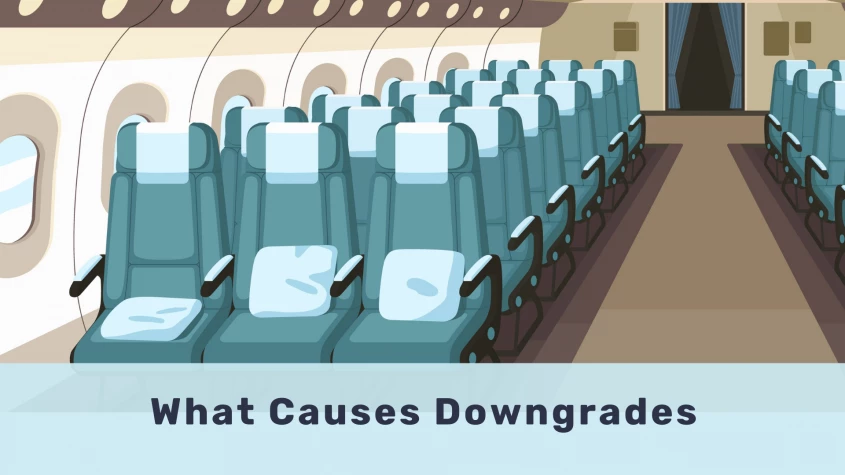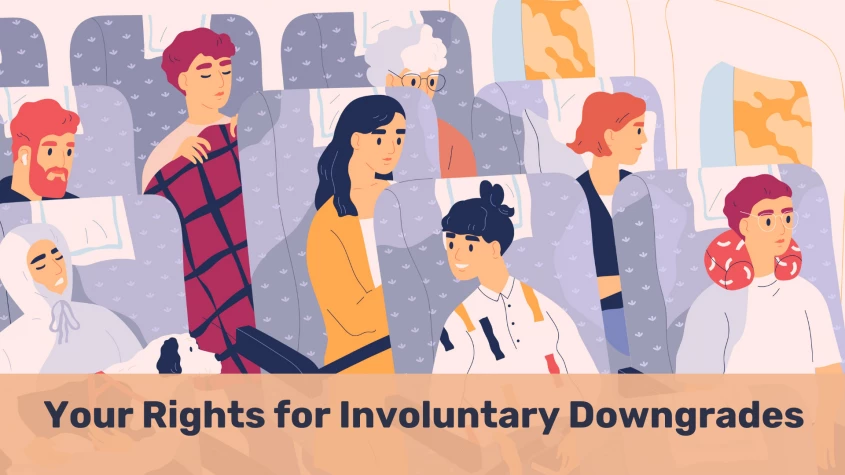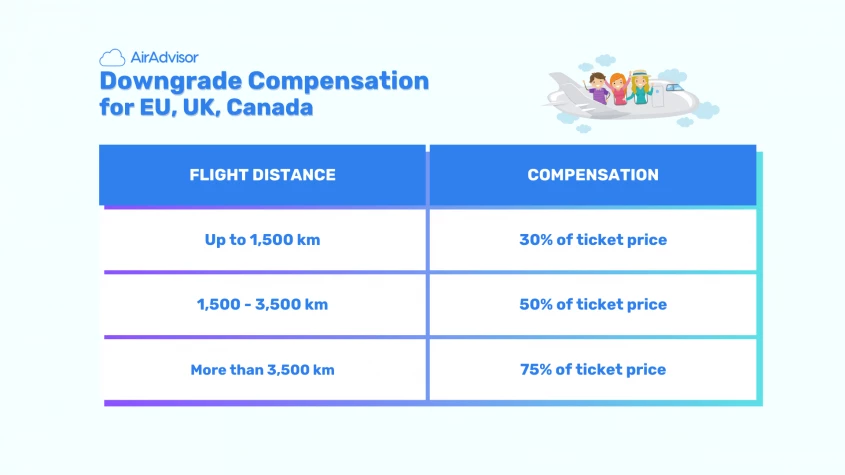Flight Downgrade Compensation: Navigating Airline Policies with Ease
You could get up to 75% of your ticket price in airline compensation if your seat is downgraded
Right before boarding, you find out that your seat has been reassigned. Even worse, your ticket was in business class, but now you’re reassigned to economy. Can you relate? So, why do airlines do this and what can you do to get your money back? Afterall, you did pay for a higher priced seat.
Fortunately, you do have rights for involuntary downgrades, and you can even get compensated for the inconvenience. In this guide, we’re going to explore these issues and other important facts related to airline downgrades.
Reviews.io 4.6/5 based on 14,431 reviews
But first, want to see if your flight is eligible for compensation? If you’ve had a flight disruption in the past 3 years, you could be eligible for up to €600. It’s free and easy to check! Just enter your flight details below.
Check eligibilityKey Takeaways
- If your seating class has been downgraded, airlines are required to compensate you between 30-75% of your purchased ticket price.
- The exact amount of compensation you could receive is based on the distance of your flight.
- You don’t have to repay the airline for seating upgrades.
What is an Involuntary Downgrade
An involuntary downgrade is a situation where the airline reassigns a higher class seat to a lower one. Downgraded passengers can go from first class or business class to economy, but can happen to any class when there is room for downgrading.
Passengers can be informed about this at any time before departure, but the most problematic downgrading happens at the last minute when there’s no time to make alternate plans easily.

What Causes Downgrades
If you get downgraded, don’t take it personally. Any number of factors can contribute to airlines making these kinds of decisions. Let’s look at some of the most common reasons.
Changing Planes
Sometimes the aircraft that was intended for your scheduled flight has to be swapped out for another plane because of technical problems or a bird strike. When this happens, the new plane could be completely different from the original one with fewer seats or fewer premium seats. This could cause passengers to be downgraded.
Overbooked Flights
To maximise profits and efficiency, airlines frequently oversell flights in case some passengers don’t show up. However, this can backfire if all passengers arrive for boarding. When this happens to the premium cabin, passengers will be downgraded so that more people can be accommodated.
Segmenting Cabins
These days, airlines seem to be creating more and more fare classes. Because of this segmentation, it is easier for one class to be oversold and causing more seat downgrades as a result. For example, instead of using the four basic classes: First Class, Business, Premium Economy and Economy, some airlines also offer Basic Economy and Ultra Luxury classes.
Seats for Airline Crew
Pilots and crew members need to rest, especially on long-haul flights. In fact, they are required to do so in most countries. In the US, the Federal Aviation Administration requires these breaks, which means that premium seats may be needed for crewmembers. As a result, some passengers may be downgraded.
If your flight was delayed, canceled or overbooked within the last 3 years, you could be eligible for up to €600 in compensation.Check Your Flight
How Airlines Prioritise Downgrades
Even though it may seem arbitrary, airlines have specific policies for dealing with downgrades. Usually, their decision is based on a combination of a passenger’s status as a frequent flyer, their seating class, and when they checked-in.
So, if you were a frequent flyer with Delta, for example, and you bought a seat in first or business class, then chances are you wouldn’t be downgraded. On the other hand, if you didn’t have status as a frequent flyer, booked a seat in business class and checked-in late, you might be bumped to coach if business class was oversold.

Your Rights and Compensation for Involuntary Downgrades
Your rights for downgrades and the compensation associated with it will be different depending on where you’re travelling.
European Union
In the EU, your air passenger rights for delays, cancellations, and involuntary downgrades are protected by EU Regulation 261 (EU 261). The rules of these regulations state that airlines may be required to compensate you between 30%-75% of the price you paid for your ticket if your original seat is involuntarily downgraded to a lower class. In order to be eligible for EU protections, you must be flying with an EU carrier like Air France or departing from an EU airport. if you’re flying with a non-EU carrier.
The exact amount you could receive is determined by flight distance and must be provided to you within 7 days.
Flight Distance | Amount of Compensation |
Up to 1,500 km | 30% of ticket price |
1,500 - 3,500 km | 50% of ticket price |
More than 3,500 km | 75% of ticket price |
United Kingdom
On flights with a UK airline like British Airways or flights departing from a UK airport, your passenger rights are protected by UK 261. These regulations are nearly identical to EU 261 and require airlines to compensate passengers a percentage of their purchased ticket price based on the distance of their flight.
Canada
Canada’s air passenger rights are regulated by the Canadian Transportation Agency and are similar to the rights for passengers in the EU and UK. So, if you’re flying with Air Canada or another Canadian airline or travelling to or from Canada and your seat is downgraded, you’ll receive a percentage of your purchased ticket price based on the flight distance. Also, like the EU and UK, airlines must provide this compensation to you within 7 days of the flight.
United States
In the US, passenger rights are upheld by the US Department of Transportation. The DOT states that US airlines, like Delta, must refund the difference in fare price to passengers whose seats have been downgraded involuntarily. The procedure for this varies among airlines, but you can find specifics about downgrades in the carrier's contract of carriage.
PRO TIP: If your seat is suddenly upgraded, you don’t have to pay the difference in price. So, if you bought an economy ticket and got upgraded to first class, you don’t owe anything to the airline even though there might be a considerable price difference.

How to Get Compensated for Downgrades
Airlines should reimburse you immediately for downgrades. This means that you should get cash compensation deposited to your bank account or issued to the credit card you used to buy your ticket. In some situations, this might take a few days, but carriers must refund you within 7 days of your flight.
You might also be offered vouchers or coupons, but be careful accepting these, and read all the details. It’s commonplace for vouchers to have restrictive policies and blackout dates, so be sure you know what you’re accepting.
If you aren’t given the compensation you’re entitled to right away, you can make a claim with the airline. Go to their website and find their customer service information. You might need to provide your flight number, boarding pass, and ticket information to prove your case, so as soon as you find out your seat has been downgraded, make sure to keep track of any information that will help you support your claim.
Did you know you can get up to €600 if you were denied boarding for an oversold flight? You deserve compensation for the inconvenience, right? Find out if your flight is eligible. It’s free, easy! Just enter your flight details below.
How to Avoid Involuntary Downgrades
You might not be able to avoid seating class downgrades all together, but here are some things you can do to prevent it from happening.
- Buy tickets early: The sooner you purchase your ticket, the less likely you are to be downgraded. Also, try to choose travel days that tend to have less traffic.
- Check in and arrive on-time: Many airlines will downgrade passengers who check in and arrive last, so be sure to check in early.
- Get airline status: Frequent flyers and airline loyalty members tend to avoid downgrades especially in cases where they purchased their ticket with cash and not points.
Conclusion
Seating class and cabin section downgrades might be painful from a comfort perspective, but you don’t have to feel the pain in your wallet as well. The next time you’re faced with an unfortunate seat reassignment, remember to ask the airline about how soon you’ll see your reimbursement.


Flight Compensation Calculator:
Check if you are entitled to flight delay compensation in just 3 minutes.





